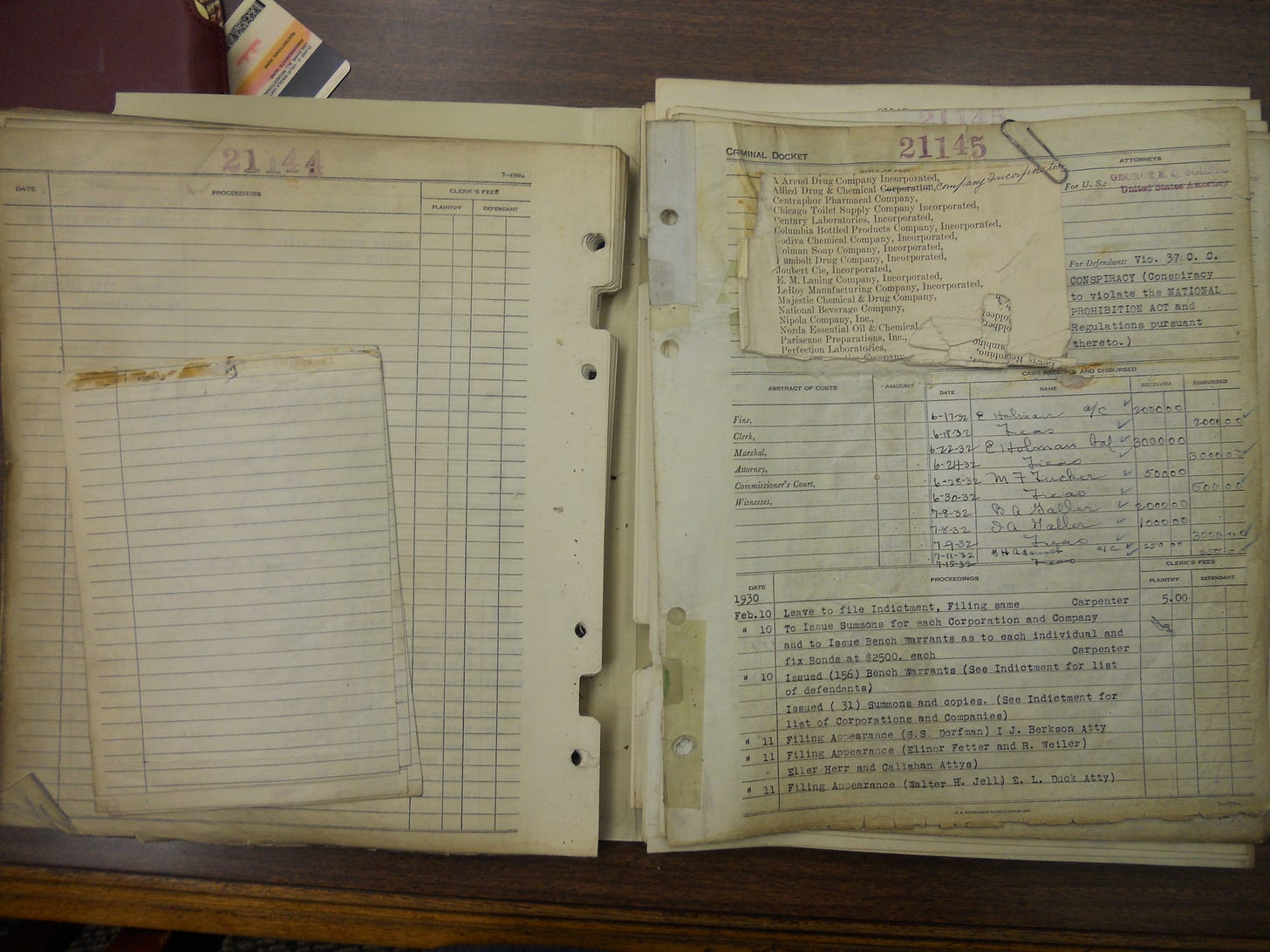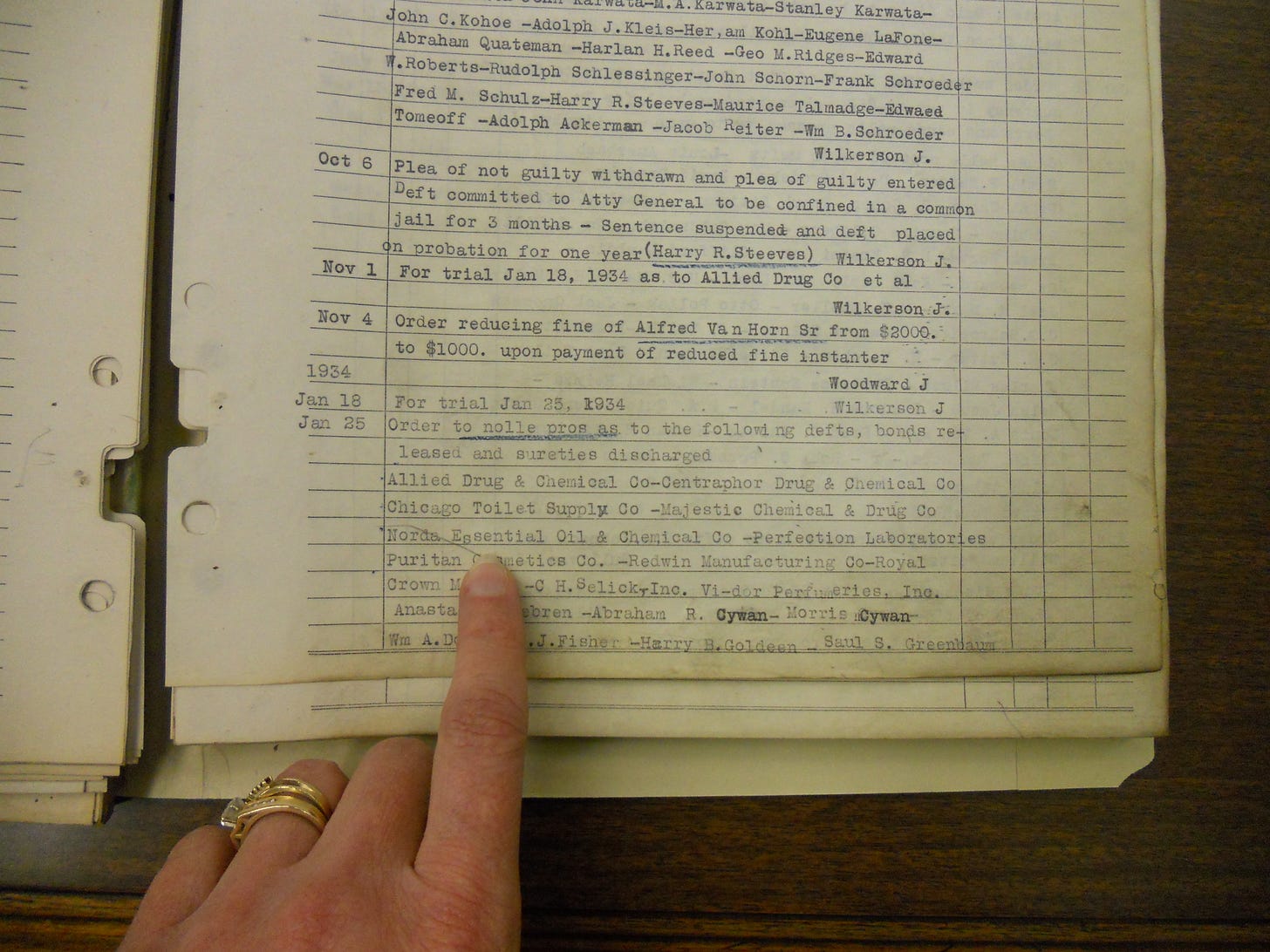Villa am Meer, Chapter 16
Was Hermann Kohl ever convicted of bootlegging?
Posted by joy.the.curious on Mar 11, 2011 in Villa Am Meer | 3 comments
If you followed my Villa Am Meer story, you know there was one outstanding question I was never able to answer… was Hermann J. Kohl (founder of Norda, Inc.) ever convicted of bootlegging by the federal court in Chicago?
Just to recap a bit, Hermann J. Kohl was the person who originally built Villa Am Meer. He and his wife, Hertha, were German immigrants who came to the U.S. in 1910. Hermann (pronounced “er-MON”) held a Ph.D. degree in Chemistry from Heidelberg University and started his own flavoring and fragrance company in 1924, Norda Essential Oils and Chemical Company.
At the time Kohl started Norda, the U.S. was already four years into Prohibition. Because of this, the company had to apply for a special government-issued permit in order to use alcohol in the preparation of their perfumes. The law was very clear about how much alcohol they were allowed to use each year, as well as what levels were allowable in the perfumes they manufactured.
On February 11, 1930, Hermann Kohl, along with 155 other individuals from across the U.S. were indicted on federal “liquor conspiracy” charges. Among them were owners and executives from several well known druggists and perfume companies, including Norda Essential Oil and Chemical Company, C.H. Selick, Inc., a well-known manufacturer of perfumes and toilet waters, E.M. Laning, Inc., another flavor and fragrance company, Joubert Cie, Inc., a perfume factory, Allied Drug and Chemical Corporation, and Maiden Lane Drug Company.
In Chapter 11 of my Villa Am Meer story, you learned that Norda had been implicated in this national “rum ring” because a man by the name of “A. Srebren” was caught selling and distributing cases of Norda perfume from his Chicago warehouse. Not a big deal, you say? The problem was that, along with the perfume, Srebren was also providing customers with caustic soda and a written formula book showing how to separate the alcohol from the essential oils. That, and the Norda Company shared warehouse space with Srebren and Company.
Early in 1930, the Chicago warehouse was raided by Prohibition agents. The following text is taken directly from the appellate brief:
“On the premises, they found a lot of whiskey, alcohol and toilet preparations. A further search of the premises netted a file of correspondence, which showed the name of the Norda Essential Oil Company. An examination of the fifth floor of the building revealed a small room with bottles bearing the label “Norda Essential Oil Company.” On the first floor of the building were found 13 cases of toilet preparations containing ten one-gallon cans each, all bearing the label of Norda Essential Oil Company; also freight bills relating to these 13 cases, showing Srebren & Co. to be the consignee. They also found 35 cases packed in a similar manner to the 13 cases, which bore the label of Srebren & Company, 121 E. 24th Street, New York City. This appears to be the address of the Norda Company, New York City.”
The evidence was plenty damning. Norda’s Vice President, Arthur Henricksen, and its Executive Secretary, Beatrice Epstein were also arrested on liquor conspiracy charges.
I was able to retrieve all this information from the National Archives in New York (Northeast Region). From court documents I received, I learned that appeals for all three Norda executives were denied, and they were ordered to stand trial in Chicago on federal bootlegging charges.
I wrote to the National Archives in Chicago (Great Lakes Region) to see if I could find the outcome of the federal case, but they wrote back to tell me the case filled an entire legal size archive box and contained over 1500 pages. In order for me to determine the outcome of the case, I would need to visit the National Archives myself and sift through the 1500 pages.
As it turns out, I just so happened to be in Chicago two weeks ago…to see OPRAH. (If you missed that story, read “My Crazy Wonderful Week“). So, with a little persuasion (a trip to Target), I was able to convince my friend’s daughter and former babysitter, Amanda, to join me on my quest. Amanda attends school at Columbia College in downtown Chicago, which was just a few blocks from our hotel.
OK, time to dive in.
First, we found a list of all the people and companies who had been named in the original indictment. In addition to the New York companies named earlier, I was surprised to also see Royal Crown Manufacturing Company (RC Cola) on the list, as well as Nipola, a St. Paul company that manufactured “Lucky Lindy” perfume, named after Charles Lindbergh, who was raised in Minnesota.
There was one other familiar name on the list that caught our eye… Gambino (yes, *those* Gambinos). Biagio (aka Frank) Gambino, trading as All Star Laboratories in Cleveland, was indicted in the same case as Hermann Kohl. Interestingly, he was already serving time at the federal prison in Fort Riley Kansas, and was ordered to be released from custody there in order to stand trial for this case in Chicago. Carmella (aka Charlie) Gambino was also served a bench warrant for his arrest in a different jurisdiction.
Heavy.
So, what exactly were Hermann, Arthur and Beatrice accused of in this 96 page indictment?
Beatrice
“53. That the defendant, Beatrice Epstein, of New York City, in the State of New York, on or about, to wit, August 1, 1928, in said City and State, signed a certificate of the action of the board of directors of the defendant, Norda Essential Oil and Chemical Company, of New York City, aforesaid, which said certificate was a part of an application for a permit applied for in the name of the defendant, Norda Essential Oil and Chemical Company of New York City, aforesaid.”
Arthur
“83. That said defendant Arthur J. Henriksen, of New York City, in the State of New York, on or about, to wit, October 4, 1929, in said City and State, signed the application for a permit issued to defendant Norda Essential Oil and Chemical Company, of New York City, aforesaid for 1050 wine gallons per month.”
Hermann
“113. That on, to wit, July 18, 1929, said defendant Herman J. Kohl, at New York City, New York, signed a letter addressed and mailed to the defendant A. Srebren Company, Chicago, Illinois.”
“113 (a). That from, to wit, January 1, 1922, to, to wit, the filing of this indictment, the defendant, Herman J. Kohl, has been acting as President of defendant Norda Essential Oil and Chemical Company, a corporation, doing business in the City of New York, New York.”
“114. That on, to wit, July 23, 1929, said defendant Herman J. Kohl, at Chicago, Illinois, in the division and district aforesaid, sold to Anastassoff Srebren, doing business as A. Srebren Company of the City of of Chicago, Illinois, 13 cases of ten gallons each of toilet water, said toilet water having theretofore been manufactured in violation of the National Prohibition Act and of the regulations made thereunder.”
“115. That during the month of, to wit, March, 1928, said defendant Herman J. Kohl, at St. Louis, Missouri, met one John A. Ayars.”
Norda, Inc.
“252. That on or about, to wit, January 1, 1927, and again on or about, to wit, January 1, 1928, and again on or about, to wit, January 1, 1929, the defendant, Norda Essential Oil and Chemical Company, a corporation, ding business in the City of New York, State of New York, made application to the Prohibition Administrator in New York City, for the renewal of a permit to withdraw large quantities of specially denatured alcohol.”
“253. That from, to wit, January 1, 1927, to, to wit, the filing of this indictment, the said defendant, Norda Essential Oil and Chemical Company, a corporation, as aforesaid, manufactured large quantities of alcoholic products, to wit, deodorant spray, in violation of the National Prohibition Act and regulations made thereunder.”
“254. That during the year 1928, at Chicago, in the division and district aforesaid, the said defendant, Norda Essential Oil and Chemical Company, a corporation, sold to the defendant, Anastassoff Srebren, large quantities of saponifiable oils and esters, to wit, “Lilac 59,” jasmine, carnation bouquet, and rose concentrate, in violation of the National Prohibition Act.”
We read and read, sifted and sifted, and while we were able to determine that several defendants did indeed plead guilty or no contest with fines ranging anywhere from $200 to $6,200 and prison sentences up to 18 months, Hermann and Arthur pleaded not guilty on June 21, 1932 (no record for Beatrice). The motion was continued to September 20, 1932 to be set for trial.
So… what happened??? (Can we end the suspense already??)
We couldn’t find anything. We went through all the documents a second time, and I photographed everything that mentioned Norda, Kohl, Henriksen or Epstein, but still nothing. We’d hit a dead end.
Finally, I asked one of the researchers at the National Archives why there was no transcript of the trial, and no outcome for the case. She asked a supervisor, and he told us that shorthand notes were very seldom saved, and therefore no transcripts existed for most trials during this era. However, we could very quickly determine the outcome of the case by checking the court docket.
Huh? The what?
He brought out an old book with yellowing pages that gave a chronological line-by-line account of everything that took place in the Chicago federal court. I quickly paged to case number 21145, which went on for the next 21 pages. It spanned all the way from February 10, 1930 (the day of the original indictment) to July 13, 1934 (four and a half years after the original indictment, and seven months after the official end of Prohibition on December 5, 1933).
I quickly scanned to September 20, 1932, the date Kohl and Henriksen’s trial had been scheduled. A lot went down that day… mostly people changing their pleas from not guilty to guilty and getting sentenced, but still nothing for Kohl and Henriksen. I scanned forward to November 26, 1932 and found appearances filed for Norda, Kohl, and Henricksen, along with Jourbert Cie, Inc. and Joseph S. Lindemann, by their mutual attorney, LaVerne Norris.
I scanned forward some more and discovered that on December 13, 1932, just a few weeks later, Joubert Cie also withdrew their not guilty plea and, instead, entered a plea of “nolle contendre” or “no contest.”
Still nothing for Kohl, Henricksen, or Epstein. And then… another continuance.
May 22, 1933
Continued to June 19th for trial on motion of U.S. Attorney as to Allied Drug and Chemical, Centraphor Pharmacal, Chicago Toilet Supply, Majestic Chemical & Drug, Norda Essential Oil and Chemical, Perfection Laboratories, Puritan Cosmetics, Redwin Manufacturing, Royal Crown, C.H. Selick, Vidor Perfumeries, and a handful of individuals including Anastassoff Srebren, A.J. Henriksen, and Herman J. Kohl.
These were the holdouts, the ones still pleading not guilty, and (most likely) the ones who could still afford their legal fees.
On October 2, 1933, another continuance was filed for the holdouts. Trial set for November 1st.
Tick, tick, tick.
On November 1, 1933, another continuance for the holdouts. Trial set for January 18, 1934.
Tick, tick, tick.
December 5, 1933… PROHIBITION REPEALED!! CHIN CHIN! EIN PROSIT! SKOL TO FISKEN!
January 18, 1934, another continuance. Trial set for January 25, 1934.
And then, miraculously…
The holdouts had won. They had bided their time and bought their freedom until Prohibition ended, and just like that (*snap*), all their charges were dropped.
Nolle pros… no prosecute… charges dropped. Just like that. Even Anastassoff Srebren himself. Crazy.
After four and a half years of legal fees and 1500 pages of paperwork, you’d think something would have come of all this. But, in the end, the holdouts won.
Nolle pros.
I’ll drink to that.
Next time
Happy Mother’s Day: A tribute to my mom
3 Comments
Susan Dressel | March 12, 2011 at 12:16 am
Hoi Hoi Hoi !!
Bob Zamboni | November 26, 2011 at 2:40 pm
Joy, I am very late for your wonderful coming of age party, but none the less in awe of your investigative and writing talents. I once upon a time was very much in love with one of the Benedict daughters, but opted for a choice of careers which required all of my efforts and cost me a heavenly relationship (Sigh!). Through all your blogs, which I have read in one sitting, I able to see the house I visited, the farm at which I rode a horse, and the house on Longboat Key every member of the family said I should come and visit, but never did. I hope that your two months of peace was a helpful respite and that sometime in the future you’ll be able to write about something else that catches your interest, and will be as rewarding for you as it has been entertaining for me and all your other readers. Thank you for being you.
Calvin Ozier | December 10, 2011 at 8:24 pm
Herman kohl was my dads godfather. Met him several times. My grandfather loaned Herman kohl 10k in the early 1920s to help him start norda. What was your interest in Herman kohl. I am trying to locate his daughter, Nell kohl Benedict. I am going to NYC soon and wanted to visit her.
![[ j o y . t h e . c u r i o u s ]](https://substackcdn.com/image/fetch/$s_!UzSv!,w_40,h_40,c_fill,f_auto,q_auto:good,fl_progressive:steep/https%3A%2F%2Fsubstack-post-media.s3.amazonaws.com%2Fpublic%2Fimages%2F9a3fc6e9-2c7b-49f3-a947-5510d6ac2bd3_500x500.png)
![[ j o y . t h e . c u r i o u s ]](https://substackcdn.com/image/fetch/$s_!RoQy!,e_trim:10:white/e_trim:10:transparent/h_72,c_limit,f_auto,q_auto:good,fl_progressive:steep/https%3A%2F%2Fsubstack-post-media.s3.amazonaws.com%2Fpublic%2Fimages%2Ff10a4cb8-9c26-4c77-a86d-fd0df8c2f58f_1344x256.png)





